Tell-Tale Signs of Poor Indoor Air Quality and How to Improve It
12/27/19
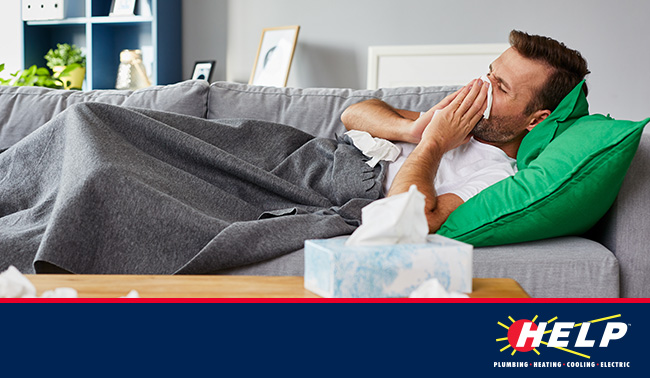
An unfortunate side effect of the excellent insulation and air sealing in modern homes is that little fresh air circulates through the rooms. This could result in a dangerous build-up of dust, dirt, and other indoor air pollutants if there isn’t sufficient ventilation.
The U.S. Environmental Protection Agency has identified low indoor air quality as a major health threat in the country today and you should seek ways to protect your family’s health from this growing problem.
There are a few ways that you can detect a drop in indoor air quality inside your home. Should you notice any of these below warnings, contact HELP Plumbing, Heating, Cooling and Drains and speak with one of our air quality specialists. We may recommend duct cleaning or the installation of air cleaners and purifiers to restore your air to a healthy level.
Tell-Tale Signs You Have Poor Indoor Air Quality
An increase in asthma triggers
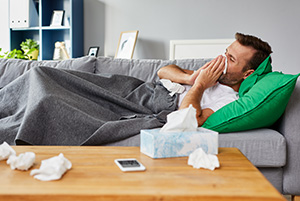 If there are people who live in your home who have asthma — even a mild case — then an increase in asthma attacks that comes from no other discernible reason is probably the fault of various triggers suspended in the indoor air. Among the common triggers for asthma that can pollute a home’s air are pollen, pet dander, dust mites, hair, and sawdust from construction. Pay attention to these attacks, since improving air quality can be life-saving for asthma sufferers.
If there are people who live in your home who have asthma — even a mild case — then an increase in asthma attacks that comes from no other discernible reason is probably the fault of various triggers suspended in the indoor air. Among the common triggers for asthma that can pollute a home’s air are pollen, pet dander, dust mites, hair, and sawdust from construction. Pay attention to these attacks, since improving air quality can be life-saving for asthma sufferers.
A rise in cold- and flu-like symptoms
You don’t need to have asthma or allergies to have a bad reaction to poor indoor air. The contaminants in your house will lead to respiratory trouble, difficulty sleeping, nausea, eye and skin irritation, fatigue, congestion, and a host of other ailments that resemble the common cold or a mild flu. If there seems to be a rash of these problems among your household, then look into the possibility of cleaning the air.
The house is difficult to keep clean
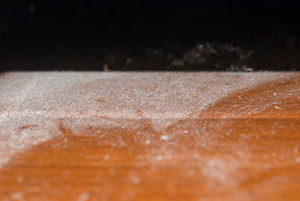 If your HVAC system is continually blowing out dust and dirt from a reservoir of contamination trapped in the vents, then it will spread all over your furnishings and make dusty surfaces omnipresent. If cleaning dust off surfaces is turning into an every-other-day ritual, and corners are constantly filling up with dirt, than you may have an HVAC system clogged up with pollutants… and those pollutants are certainly also floating around in the air and reaching your lungs.
If your HVAC system is continually blowing out dust and dirt from a reservoir of contamination trapped in the vents, then it will spread all over your furnishings and make dusty surfaces omnipresent. If cleaning dust off surfaces is turning into an every-other-day ritual, and corners are constantly filling up with dirt, than you may have an HVAC system clogged up with pollutants… and those pollutants are certainly also floating around in the air and reaching your lungs.
What You Can Do to Improve Indoor Air Quality
Schedule bi-annual HVAC maintenance
The best way to prevent HVAC and duct problems is by scheduling professional heating maintenance in the fall and air conditioning maintenance in the spring. Make sure your HVAC service provider cleans your condenser coils, evaporator coils, and drain pans. Committing to regular HVAC preventative maintenance is essential for maintaining clean and efficient ductwork.
Clean duct vents and registers
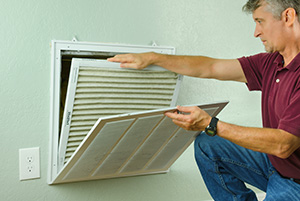 You can help maintain clean ductwork by regularly vacuuming and cleaning your supply and return registers and the surrounding area. The grilles can easily be removed and cleaned. This is also a good time to make sure that none of your vents or registers are blocked or obstructed. You want all your vents and registers to be clean and clear.
You can help maintain clean ductwork by regularly vacuuming and cleaning your supply and return registers and the surrounding area. The grilles can easily be removed and cleaned. This is also a good time to make sure that none of your vents or registers are blocked or obstructed. You want all your vents and registers to be clean and clear.
Dust and vacuum your home regularly
In addition to periodically removing and cleaning your vents and registers, it’s important to maintain a clean home by dusting and vacuuming regularly. We recommend using a vacuum with HEPA filtration. Learn how to maintain a clean home and HVAC system with these cleaning tips.
Use high-efficiency air filters and replace them regularly
Ask your HVAC service provider what the highest efficiency air filter your heating and cooling system can use. We typically recommend using air filter with a MERV rating of 11-13. The higher the MERV rating, the better the filtration, but once you get above MERV 13, the filter may be too thick, which can reduce airflow. Learn more about the best filters for your HVAC system.
Keep plenty of backup air filters on hand so you can replace them when they become clogged. We recommend checking your air filter every 30 days by removing the filter and holding it up to the light. If light cannot pass through the filter, your air filter is clogged and needs to be replaced. Do not wait more than 90 days to replace your air filter. When replacing your air filter, make sure the printed arrows on the airflow are pointing in the direction of the airflow.
Seal supply and return registers during construction or renovation projects
If you are doing any construction or renovation work to your home, make sure your supply and return registers are properly sealed. Do not unseal your registers or run your HVAC system until everything has been cleaned up. Speak with a professional HVAC company before starting any home construction or renovation projects.
Prevent your ducts from becoming wet
If you have a whole-home humidification system installed in your HVAC system, make sure you are strictly following the manufacturer’s instructions.
Repair any water leaks or water damage as soon as you notice them. Pay attention to leaking condensate drain pans and the presence of water or condensation near your HVAC system.
We recommend sealing and insulating your ductwork, especially in unconditioned areas of the home, such as attics, basements, and crawl spaces. This will prevent moisture from entering the ductwork in addition to improving HVAC efficiency and overall cleanliness.
Even if you don’t need a duct replacement, we highly recommend sealing and insulating air ducts to keep your system clean and save you energy on heating and cooling bills.
Maintaining healthy indoor air quality is always worth the time and money. After all, if the air inside your home isn’t healthy, it can cause all kinds of health problems for you and your family.
The Benefits of Clean Indoor Air
The EPA lists poor indoor air quality as a real and current potential risk to our health. Effects include headaches, nausea, sore throats and colds all of which potentially increase discomfort and aggravate symptoms in those with allergies, asthma and other breathing ailments. At HELP Plumbing, Heating, Cooling and Drains, we can help you provide cleaner air inside your home, making it more comfortable for all family members with indoor air quality improvement options that can be installed as upgrades to your existing HVAC systems.
Choosing an IAQ System that Works
Luckily there are a number of great products out there designed to remove these pollutants before they cause you and your family discomfort or illness. Before you run out to buy a new system, however, you should first consider what each has to offer and what pollutants you need to remove. You might have some idea about this already, but the best thing to do is talk to a professional who can help assess your indoor air and determine which types of contaminants are most prevalent in your home.
We’ll give you expert advice and professional installations of the best heating systems to suit your individual needs, giving you the highest indoor air quality for your family.
Germicidal UV Light
Enjoy the same high-level protection used throughout hospitals and health care facilities to stop the spread of disease through airborne particles with a professionally installed, Germicidal UV Lamp. The germicidal UV lamp kills and sterilizes airborne particles, allowing you to rest easy in the knowledge that you and your family are breathing the highest quality of indoor air.
HEPA Filters
A High Energy Particulate Filter (HEPA) can remove up to 99.7% of airborne particles such as dust, dust mite feces, pollen, dog hair and mold spores, improving the quality of your indoor air and allowing everyone to breathe easy and comfortably.
Humidity Control
By controlling the level of humidity within your home, you’ll benefit from cleaner air. As excess moisture is removed, dampness is reduced leaving surfaces less prone to mold infestations.
Air Purification
Beneficial to allergy or asthma sufferers, air purification systems can be fitted to your existing HVAC system and aid in the removal of airborne dust particles, mold spores, pollen, dust mite feces, and animal hair.
Expert Advice and Installation
Our experienced team members can answer your questions and provide expert advice on the most suitable system to improve your home’s air quality. Our technicians will also provide a professional installation of any system or upgrade you chose, so you can enjoy maximum indoor air quality throughout the year.
Satisfaction Guaranteed
Be treated to a red-carpet level of customer service and care that we’re sure you’ll appreciate, satisfaction guaranteed.
At HELP Plumbing, Heating, Cooling and Drains, we’ll treat your home with both care and respect by wearing booties on our shoes, covering work areas before we start work and tidying up before we leave.
To breathe easier and enjoy cleaner air in your home anywhere in the Cincinnati region, call and schedule an appointment with the indoor air quality specialists of contact HELP Plumbing, Heating, Cooling and Drains today at (513) 333-4357.
Posted in: Indoor Air Quality
Learn More!
Offer Expires Soon
